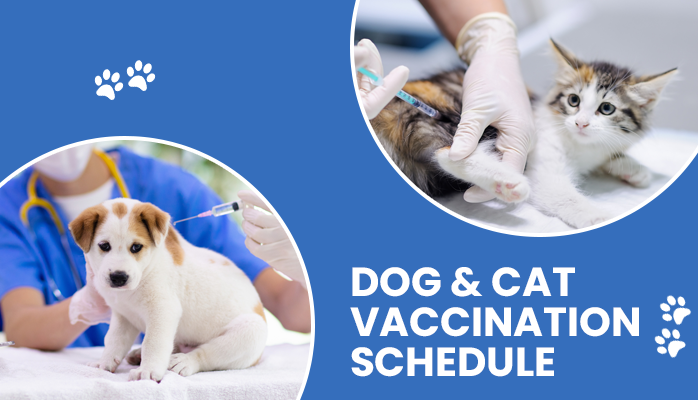




The greatest thing you can do to ensure the joy and well-being of your dog or cat is to guard them safe from major illnesses that can even be fatal. Immunizations are lifesaving. Although each dog and cat has different immunization requirements, there are some general rules you may go by to make sure your furry companion remains up to date. The most effective way to keep an accurate cat or dog vaccination schedule is to set routine meetings with your vets. Your veterinarian can determine which specific vaccinations your cat or dog requires.
Immunizations produce antibodies. They support your pet's immune system in fending off contagious illnesses that could harm their health. A disease-causing organism is given to your dog or cat during vaccination. His or her immunity is stimulated and given guidance on how to fight against those ailments in the coming years.
While there is no 100% protection against disease, the appropriate immunizations can help your pet fend off infections or heal from illnesses much more quickly.
Immunizations for Puppies and Dogs
In India, puppies should have the following core vaccinations: rabies, parvovirus, hepatitis, parainfluenza, and distemper. Viral illnesses are the cause of parvo, distemper, and hepatitis, which are all deadly. These illnesses spread swiftly if treatment is not received and can even cause death.
| Vaccines | Types | Age |
| DhPPi/ Lepto | Primary | 45 days |
| DhPPi/ Lepto | Booster 1 | After 1 month |
| DhPPi/ Lepto | Booster 2 | After 1 month |
| DhPPi/ Lepto | Annual | After 1 year |
| Corona | Primary | 60 days |
| Corona | Booster | After 1 month |
| Corona | Annual | After 1 year |
| Anti rabies | Primary | 60 days |
| Anti rabies | Booster | After 1 month |
| Anti rabies | Annual | After 1 year |
| Kennel cough | Primary | 1 month |
| Kennel cough | Annual | After 1 year |
Deworming schedule:
Once in 15 days till three months of age
Once a month from 3 to 6 months of age
Once in 3 months after 6 months of age
For Adult Dogs:
DHPP: Following the first-year booster dose, once every three years
Rabies: After the first-year booster shot, once every three years
Leptospirosis: Each year following the first year of booster shots
If the vet advises your dog, administer a booster shot of Bordetella every year following the first year.
Vaccines for Cats:
The core vaccines in the cat vaccination schedule in India include FVRCP (also known as the feline distemper vaccine which defends against three feline viruses: rhinotracheitis, calicivirus and panleukopenia.). Rabies is another important vaccine that should not be missed by the kittens.
The non-core vaccines cover Bordetella, Chlamydophila, and Feline leukaemia (FeLV). Adult cats and kittens require various immunization schedules.
The most prevalent infectious disease in cats that weakens their immune systems is called feline leukaemia. It may also lead to other fatal illnesses. Cats can contract feline leukemia by coming into touch with the saliva or nasal discharge of an affected cat.
| Age | Vaccination | Type |
| 90 days | PCHR | Primary |
| After 1 month | PCHR | Booster |
| After 12 months | PCHR | Annual |
Deworming schedule:
Once a month till 3 months of age
One in 3 months after 3 months of age
By maintaining up-to-date immunization records, the veterinarians at CGS can assist you in shielding your dog or cat against a variety of dangerous illnesses and conditions.